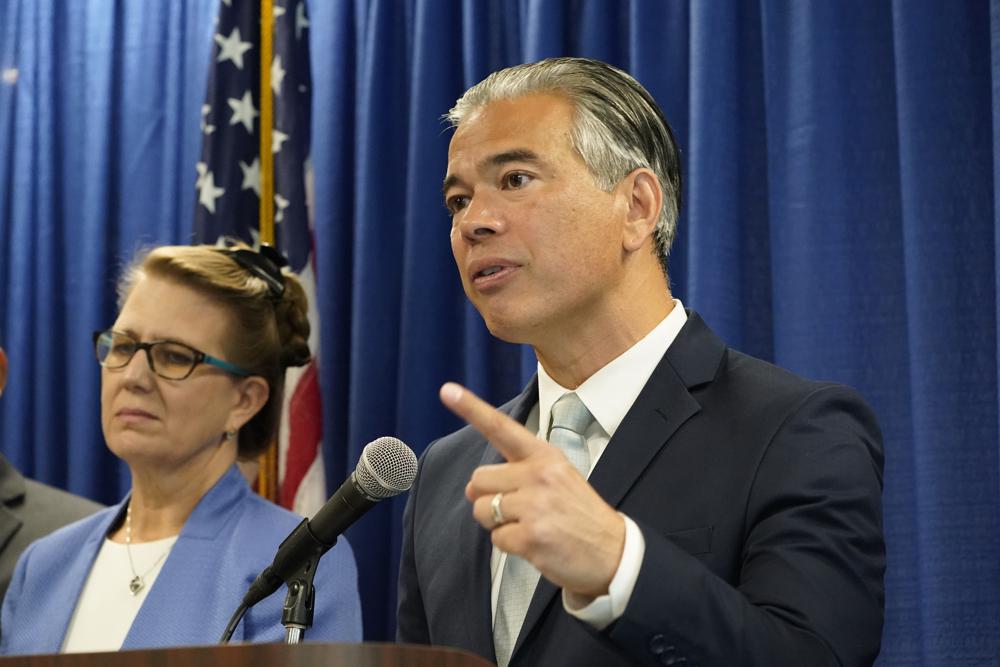
California is suing Amazon, accusing the company of violating the state’s antitrust and unfair competition laws by stifling competition and engaging in practices that push sellers to maintain higher prices on products on other sites.
The 84-page lawsuit filed Wednesday in San Francisco Superior Court mirrors another complaint filed last year by the District of Columbia, which was dismissed by a district judge earlier this year and is now going through an appeals process.
But officials in California say they believe they won’t encounter a similar fate, partly due to information collected during a more than two-year investigation that involved subpoenas and interviews with sellers, Amazon’s competitors as well as current and former employees at the e-commerce giant.
In the lawsuit, California Attorney General Rob Bonta’s office said Seattle-based Amazon used contract provisions to effectively bar third-party sellers and wholesale suppliers from offering lower prices for products on non-Amazon sites, including on their own websites. That, in turn, harms the ability of other retailers to compete.
The suit maintains merchants that do not comply with the policy could have their products stripped from prominent listings on Amazon and face other sanctions such as suspensions or terminations of their accounts. It alleges Amazon’s policy essentially forces merchants to list higher prices on other sites, helping it maintain its e-commerce dominance.
Among other things, the California lawsuit seeks to stop Amazon from entering into contracts with sellers that harm price competition. It also seeks a court order to compel Amazon to pay damages to the state for increased prices. State officials did not say how much money they are seeking.
The company has said in the past that sellers set their own prices on the platform. It has also said it has the right to avoid highlighting products that are not priced competitively. In a statement sent Wednesday, Amazon reiterated those points and said Bonta has it “exactly backwards.”
“The relief the AG seeks would force Amazon to feature higher prices to customers, oddly going against core objectives of antitrust law,” the company said. “We hope that the California court will reach the same conclusion as the D.C. court and dismiss this lawsuit promptly.”
Amazon controls roughly 38% of online sales in the U.S., more than Walmart, eBay, Apple, Best Buy and Target combined, according to the research firm Insider Intelligence. About 2 million sellers list their products on Amazon’s third-party marketplace, accounting for 58% of the company’s retail sales.
During a news conference on Wednesday, Bonta said some vendors have expressed they would offer lower prices on other sites with lower seller fees, but don’t do so to avoid punishment from Amazon.
“Amazon has stifled its competition for years, not by successfully competing, but by blocking competition on price,” Bonta said. “As a result, California families paid more, and now Amazon must pay the price.”
He said the lawsuit is also a message to other companies who “illegally bend the market at the expense of California consumers, small business owners and the economy.”
The tech industry’s allies also slammed the lawsuit. Adam Kovacevich, CEO of the industry trade group Chamber of Progress, which receives funding from Amazon and other tech companies, said the case would force Amazon to raise prices.
“That makes no sense while consumers shop for bargains to counter inflation, and it’s based on a legally unsound theory already rejected by federal courts,” Kovacevich said.
Despite that defense, Amazon’s market power has been a subject of scrutiny from lawmakers and advocacy groups calling for stricter antitrust regulations. Earlier this year, congressional lawmakers urged the Justice Department to investigate if the company collects data on sellers to develop competing products and offer them more prominently on its site. Critics have also lambasted the increasing fees imposed on sellers, which makes it more difficult for merchants to enter the market.
